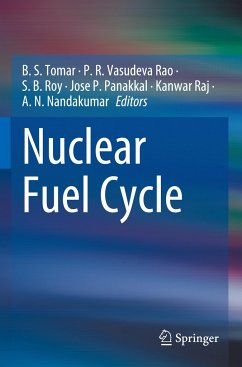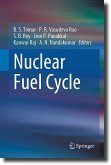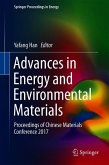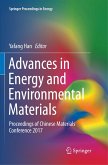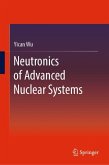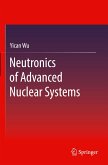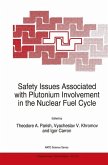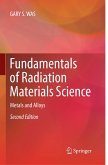Nuclear Fuel Cycle
Herausgegeben:Tomar, B. S.; Rao, P. R. Vasudeva; Roy, S. B.; Panakkal, Jose P.; Raj, Kanwar; Nandakumar, A. N.
Nuclear Fuel Cycle
Herausgegeben:Tomar, B. S.; Rao, P. R. Vasudeva; Roy, S. B.; Panakkal, Jose P.; Raj, Kanwar; Nandakumar, A. N.
- Broschiertes Buch
- Merkliste
- Auf die Merkliste
- Bewerten Bewerten
- Teilen
- Produkt teilen
- Produkterinnerung
- Produkterinnerung
The present book describes the various processes involved in different stages of the entire nuclear fuel cycle, which include exploration of uranium, thorium, and other nuclear materials, mining and milling of ores, conversion of the separated nuclear material into nuclear grade, fabrication of different types of nuclear fuels and their physical as well as chemical quality control, thermodynamics of the interaction among fuel and fission products during reactor operation, post irradiation examination, spent fuel reprocessing, radioactive waste management, accounting and control of nuclear…mehr
Andere Kunden interessierten sich auch für
![Nuclear Fuel Cycle Nuclear Fuel Cycle]() Nuclear Fuel Cycle45,99 €
Nuclear Fuel Cycle45,99 €![Advances in Energy and Environmental Materials Advances in Energy and Environmental Materials]() Advances in Energy and Environmental Materials163,99 €
Advances in Energy and Environmental Materials163,99 €![Advances in Energy and Environmental Materials Advances in Energy and Environmental Materials]() Advances in Energy and Environmental Materials150,99 €
Advances in Energy and Environmental Materials150,99 €![Neutronics of Advanced Nuclear Systems Neutronics of Advanced Nuclear Systems]() Yican WuNeutronics of Advanced Nuclear Systems119,99 €
Yican WuNeutronics of Advanced Nuclear Systems119,99 €![Neutronics of Advanced Nuclear Systems Neutronics of Advanced Nuclear Systems]() Yican WuNeutronics of Advanced Nuclear Systems119,99 €
Yican WuNeutronics of Advanced Nuclear Systems119,99 €![Safety Issues Associated with Plutonium Involvement in the Nuclear Fuel Cycle Safety Issues Associated with Plutonium Involvement in the Nuclear Fuel Cycle]() ParishSafety Issues Associated with Plutonium Involvement in the Nuclear Fuel Cycle145,99 €
ParishSafety Issues Associated with Plutonium Involvement in the Nuclear Fuel Cycle145,99 €![Fundamentals of Radiation Materials Science Fundamentals of Radiation Materials Science]() GARY S. WASFundamentals of Radiation Materials Science61,99 €
GARY S. WASFundamentals of Radiation Materials Science61,99 €-
-
-
The present book describes the various processes involved in different stages of the entire nuclear fuel cycle, which include exploration of uranium, thorium, and other nuclear materials, mining and milling of ores, conversion of the separated nuclear material into nuclear grade, fabrication of different types of nuclear fuels and their physical as well as chemical quality control, thermodynamics of the interaction among fuel and fission products during reactor operation, post irradiation examination, spent fuel reprocessing, radioactive waste management, accounting and control of nuclear materials, and safety aspects involved in handling and transportation of nuclear materials. The book provides the fundamental knowledge to the practicing nuclear scientists and engineers, young researchers, and postgraduate students interested in pursuing a career in nuclear industry in general and those engaged in human resource development in the field of nuclear science and technology in particular. It can also be prescribed as a textbook for a course on nuclear fuel cycle at postgraduate level.
Produktdetails
- Produktdetails
- Verlag: Springer / Springer Nature Singapore / Springer, Berlin
- Artikelnr. des Verlages: 978-981-99-0951-3
- 2023
- Seitenzahl: 464
- Erscheinungstermin: 17. Mai 2024
- Englisch
- Abmessung: 235mm x 155mm x 25mm
- Gewicht: 698g
- ISBN-13: 9789819909513
- ISBN-10: 9819909511
- Artikelnr.: 70708074
- Herstellerkennzeichnung Die Herstellerinformationen sind derzeit nicht verfügbar.
- Verlag: Springer / Springer Nature Singapore / Springer, Berlin
- Artikelnr. des Verlages: 978-981-99-0951-3
- 2023
- Seitenzahl: 464
- Erscheinungstermin: 17. Mai 2024
- Englisch
- Abmessung: 235mm x 155mm x 25mm
- Gewicht: 698g
- ISBN-13: 9789819909513
- ISBN-10: 9819909511
- Artikelnr.: 70708074
- Herstellerkennzeichnung Die Herstellerinformationen sind derzeit nicht verfügbar.
Prof. B. S. Tomar is presently Institute Chair Professor at Homi Bhabha National Institute (HBNI), Mumbai. He joined the Radiochemistry Division of Bhabha Atomic Research Centre (BARC), Mumbai, in 1982. He is an expert in nuclear and radiochemistry, radiation detection and measurement, and non-destructive assay of nuclear materials and has published more than 220 research papers in international journals. He has taught the subject of nuclear and radiochemistry at postgraduate level for over 25 years. He superannuated as Director Radiochemistry and Isotope Group, BARC, in December 2017 and later served as Raja Ramanna Fellow, DAE, during 2018-2021. He was Visiting Professor to Technical University, Delft, The Netherlands, during 2007-2008 and Member of the Standing Advisory Group on Safeguards Implementation (SAGSI), IAEA, during 2016-2017. Prof. P. R. Vasudeva Rao was the Vice Chancellor of Homi Bhabha National Institute (HBNI), a Deemed-to-be University under theDepartment of Atomic Energy(DAE), India till recently. He earlier served as Scientific Officer with Indira Gandhi Centre for Atomic Research (IGCAR) at Kalpakkam and was its Director, at the time of his superannuation. He obtained his Ph.D. degree in Chemistry from University of Bombay in 1979 for his work on chemistry of actinide elements. Prof. Rao is an expert in Fuel Cycle Chemistry and especially chemistry of fast reactor fuel cycle and is well known for his research on actinide separations. He was responsible for the development of several facilities for R&D on fast reactor fuel cycle at IGCAR. He has over 300 publications in peer-reviewed international journals. He is a Fellow of the Indian National Academy of Engineering as well as the National Academy of Sciences, India. Dr. S. B. Roy pursued her B.Tech. in Chemical Engineering from Calcutta University in 1981 and obtained doctorate degree in Chemical Engineering from Indian Institute of Technology (IIT) Bombay in 2001. She joined the 25th batch of BARC training school in 1981 and later joined Uranium Extraction Division of BARC in 1982. She was instrumental in development of uranium fuel of different grades for special applications, process for recovery of uranium from secondary sources like monazite, research, facility development and production management of specific quality nuclear fuel materials for various Indian Research Reactors, and development and implementation of largescale metallothermic reduction processes for Nuclear Grade Uranium Metal production. As Director of Chemical Engineering Group, she provided strategic direction, technical guidance, and human resource development to the implementation of various programs undertaken by different divisions of the group in the areas of nuclear materials. Additionally, she provided guidance to other units of DAE on research and project activities as Member of Nuclear Fuel Complex Board (NFC, Hyderabad) and Heavy Water Board (HWB, Mumbai). Post superannuation, she served as Raja Ramanna Fellow, DAE, and later as Visiting Scientist till November 2020, wherein she contributed in the field of Safety Review and Human Resource Development. Dr. Jose P. Panakkal joined Bhabha Atomic Research Centre from 16th batch of training school and had been working at BARC in various capacities for 40 years. He superannuated as Head, Advanced Fuel Fabrication Facility, Nuclear Fuels Group, BARC, and was awarded Raja Ramanna Fellowship by DAE on superannuation. He also had worked as Guest Scientist at Fraunhofer Institute of NDT, Saarbrucken, Germany (1987-89). He was recognized as Ph.D. Guide by Mumbai University and Homi Bhabha National Institute (HBNI). He is specialized in the fabrication of nuclear fuels particularly containing plutonium for both thermal and fast reactors and was in charge of an industrial scale MOX (Mixed Oxide) fuel fabrication facility which has made MOX fuels for various types of reactors (BWRs, PHWRs, and fast reactors). He has also developed new techniques for fabrication, quality control, and non-destructive evaluation of nuclear fuels and material characterization as evident from his 280 publications including 130 publications in international journals and conferences. Shri Kanwar Raj graduated with honors in Chemical Engineering in 1972 from Indian Institute of Technology Roorkee, India. Since then, he has worked in the various capacities in the field of design, research & development, operations, and safety analysis of radioactive waste management plants/ facilities. Shri Raj has extensive expertise in design, commissioning, and operation of high-level radioactive vitrification systems as well as in evaluation of long-term performance of vitrified waste product under geological disposal conditions. As Chief Scientific Investigator, he has led two BARC teams for studies in this area in collaboration with Kfk /INE Karlsruhe and as apart of coordinated research program of IAEA, Vienna. As Head, Waste Management Division, BARC, Mr. Raj supervised operations of Waste Management Facilities at Kalpakkam, Tarapur, and Trombay Centres of the Department of Atomic Energy, India. He has gained hands-on experience in management of radioactive waste generations from the entire nuclear fuel cycle, viz. radiochemical laboratories, fuel fabrication facilities, research/power reactors, reprocessing plants, etc. His expertise also encompasses management of spent radiation sources from various industries, medical centers, and research institutions. Mr. Raj has experience in preparation of National and International Waste Safety Standards for Indian Atomic Energy Regulatory Board and IAEA. He is the author/co-author of about 80 research papers published in various journals. A.N.Nandakumar, a Ph.D. in Physics from Mumbai University, has 34 years of R&D experience in the Bhabha Atomic Research Centre, Mumbai, India, in the fields of safe transport of radioactive material, calculation of radiation shielding, and calculation of radiation dose under normal and emergency conditions involving radioactive material. He was Chief Scientific Investigator from India for the IAEA Coordinated Research Projects on Development of PSA techniques relating to the Safe of Radioactive Material and on Collection of Accident Data for Quantification of Risk in Transport of Radioactive Material. Subsequently, he was appointed Head, Radiological Safety Division, Atomic Energy Regulatory Board, Mumbai. He worked as Transport Safety Specialist and as Consultant in the Radiation, Transport and Waste Safety Division, IAEA, Vienna. He has published over 60 scientific and technical papers in national/international scientific journals and conference proceedings.
Chapter 1. Nuclear Fuel Cycle: Introduction.- Chapter 2. Exploration, mining, milling and processing of Uranium.- Chapter 3. Fabrication of Nuclear Fuel Elements.- Chapter 4. Quality Control of Nuclear Fuels.- Chapter 5. Thermophysical and thermochemical properties of nuclear fuels.- Chapter 6. Post-Irradiation Examination of Fuel.- Chapter 7. Nuclear Fuel Reprocessing.- Chapter 8. Radioactive Waste Management.- Chapter 9. Accounting and Control of Nuclear Materials.- Chapter 10. Transport and Storage of Nuclear Materials.- Chapter 11. Radiation Protection.
Chapter 1. Nuclear Fuel Cycle: Introduction.- Chapter 2. Exploration, mining, milling and processing of Uranium.- Chapter 3. Fabrication of Nuclear Fuel Elements.- Chapter 4. Quality Control of Nuclear Fuels.- Chapter 5. Thermophysical and thermochemical properties of nuclear fuels.- Chapter 6. Post-Irradiation Examination of Fuel.- Chapter 7. Nuclear Fuel Reprocessing.- Chapter 8. Radioactive Waste Management.- Chapter 9. Accounting and Control of Nuclear Materials.- Chapter 10. Transport and Storage of Nuclear Materials.- Chapter 11. Radiation Protection.

